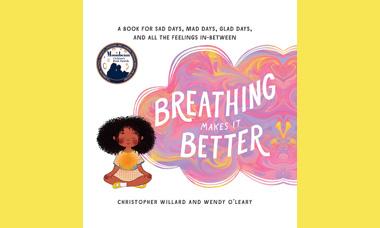
Feelings can be overwhelming, especially for young children. Sadness, anxiety, and even positive feelings like excitement are powerful enough to affect learning and social-emotional development.
Fortunately, early educators, parents, caregivers have an equally powerful tool they can share with young children: mindfulness.
Children’s book by local author helps adults teach mindfulness
Mindfulness doesn’t need to be a complicated concept for young children. Breathing Makes It Better, a children’s book by local author and public speaker Wendy O’Leary, M.Ed. and Boston-based psychologist and educational consultant Dr. Christopher Willard, makes it easy, simple, and rewarding.
Feeling sad? the authors ask. “Be still… be here… Breathe in, breathe out — peace is near.”
Feeling confused when trying to learn new things? “… When the answers are missing, and your brain feels dull and jumbled… stop and take a BREATH.”
“Mindfulness is incredibly beneficial because it gives children an opportunity to settle their system down and make conscious choices instead of responding from a place of intense emotions,” says O’Leary, a certified Mindfulness Meditation Teacher and a member of the International Mindfulness Teachers Association. “It gives them more control, is empowering, and builds resilience.”
Mindfulness has even been linked to improved focus, cognitive skills, performance, and self-esteem, and reduced anxiety and depression for children.
Breathing Makes It Better is available at Worcester Public Library, Shambhala Publications, Amazon, and from local bookstores via IndieBound. Additionally, families can read along with Wendy on Edward Street’s Day of Play website.
The Breathing Makes It Better Educator’s Guide, which is free online, is a useful tool for early educators, parents, and caregivers.
Local and online resources for children and adults
There may be no better time than 2021 to introduce young children to mindfulness.
“Mindfulness has always been a really important tool because children aren’t ready to learn when their nervous systems are activated,” O’Leary explains. “Now, with the pandemic, there’s a felt sense of anxiety that can cause a fight or flight or freeze response, which diminishes their capacity for well being and learning.”
Fortunately, resources abound that help adults share mindfulness techniques with children.
Edward Street’s Day of Play website features activities like Be the Pond, in which children watch their feelings swim by; Cosmic Kids Yoga, a chance to practice mindfulness while doing kid-friendly yoga poses; and Mindful Movement with Freeze Dance, a version of the classic game in which children pause to reflect on the physical sensations of movement and stillness.
No time for online activities? No problem. “Mindfulness,” says O’Leary, “can be as simple as one conscious breath.”
Additional resources can be found at wendyoleary.com, including free mindfulness guidance and information about professional development training, school age direct instruction, adult classes, consultations, and individual sessions.
